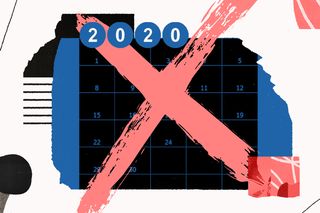
2020 Is Very Likely Canceled. What Now?
The pandemic has rendered the future uncertain, affecting mental health, housing, and careers.

Security and certainty are two of the most basic psychological human needs — both of which have been catapulted into the unknown with the onset of the Covid19 pandemic. India is under a 21-day lockdown, and we’re not certain it will be limited to three weeks. In the meantime, the nation’s populace is not only living with uncertainty about the present — in terms of the availability of basic supplies to get through the lockdown and individual coronavirus status — but also grappling with an uncertain future.
At the rate the virus is spreading today, it’s possible people around the world are looking at social distancing practices lasting from a few months to a year, especially as our healthcare institutions struggle to keep up with the exponential rise of Covid19 cases. In a pre-emptive response, many yearly events are being postponed, such as the Olympics and the Cannes Film Festival; others are debating delays, such as the Indian Premier League season. The NRC-CAA protests that took the nation by storm, with Delhi’s Shaheen Bagh as a symbol of courage, are also postponed indefinitely. As big institutions and collectives reckon with the longevity of the pandemic and accompanying lockdowns, individuals also struggle to grasp the indefinite postponement of their plans, and all the uncertainty that comes with it.
Essentially, 2020 is canceled, and people are understandably asking — what now?
Related on The Swaddle:
We Must Pause Outdoor CAA-NRC Protests, But Keep the Fight Going
“No more plans,” says Fatima, 29, from Hyderabad, who was in the middle of putting the finishing touches on her new law firm. Now, with the lockdown, Fatima says she’s still having to pay rent on the leased office space and salaries to the workers, but she is not able to bring in income on account of the courts being closed for the time being. “Startup companies are on stand by,” Fatima says, adding she’s trying to channel an optimistic outlook for the future despite having to put her life, and business, on hold.
Fatima is not alone. Music producer and beatboxer Yung.Raj is also looking at an uncertain professional future. “I was working on my album and had around four to five gigs planned for March and April and then was gonna work out an album launch tour, too. But with all future gigs canceled, I don’t know where the revenue is gonna come from until the lockdown ends,” he says. “[Because] as a full-time musician this is one of the primary ways to earn money as anyone hardly buys music these days.” To cope with the uncertainty, Raj says he’s channeling his energy into live-streaming his music, giving his fans and other producers tutorials on a subscription basis, and frequently uploading new music.
“For me producing music is a way of dealing with my anxiety, so I’ve been putting in more of my time making beats than usual.”
Being uncertain of the future is a source of worry and anxiety for most, scientists say, but how people choose to deal with the uncertainty largely varies. Simran, 24, is lamenting the failure of plans already passing her by. Living alone in Mumbai, Simran had plans to visit her family and friends this year — now, she’s not sure when she’ll be able to see them again. “I’m already an over-thinker and everything that’s happening has put me in a negative headspace,” she says. “Constant anxiety is the new normal and it’s exhausting. … At this point, I really don’t know what the future looks like. I see nothing. Life has practically paused, and I’m having a hard time finding a silver lining.”
She adds, “[There was] no way we could have known it would come to this. Now we just wait.”
“There’s no way we can make plans at the moment. Right now, the priority is the virus.”
And waiting is what many more frozen in place due to this pandemic are doing. S.S., 26, has plans to travel to the United States for further education later this year; he has even gotten a partial scholarship, he says. With the possibility of acquiring visas and educational loans hampered by the lockdown, and with the U.S. as the new center of illness, he says he’s unsure if he will be able to fulfill his plan. For now, S.S. is sitting tight and waiting for this moment to tide over. If he’s not able to go, S.S. says, “Career-wise, this takes me back to the start, to Ground Zero,” adding he is making do with freelance work for now, as he cannot enter into a long-term work contract while his travel plans hang in the balance. “[When] you work so hard for something, not getting it in the end simply breaks your heart.”
Related on The Swaddle:
For People With Mental Health Conditions, Constant Covid19 Updates Make Everything Worse
For others, like P.S., 25, the prospect of having housing post-lockdown has become uncertain. His lease ends at the end of April, he says; anticipating the lockdown lasts longer than promised, P.S. will find himself without a home. “Even if the lockdown ends on the 15th, contacting brokers, finding places — all of that within 15 days is very, very difficult. I have no idea whether my landlady is going to be nice enough to allow me a little bit of time so I can shift,” P.S. says. “While she may be nice to me, I know there are a lot of people in my situation whom it won’t be easy for.”
Everyone right now is in the same boat one way or another, says D. Naruka, who also finds herself in a limbo-like situation with her housing. “Things happen for a reason. There’s no way we can make plans at the moment. Right now, the priority is the virus. We can’t really push people for anything because all of our resources need to go into the primary priority.”
And so it does. While everybody in India is grappling with an uncertain future — wondering if they’ll have jobs, careers, housing, good health — many are suffering through an uncertain present, not knowing if they’ll have food and medicine to last through this lockdown. First, we need to ensure all of us have a present to live through, and then, if we’re lucky, we’ll be able to worry about the future.
Rajvi Desai is The Swaddle's Culture Editor. After graduating from NYU as a Journalism and Politics major, she covered breaking news and politics in New York City, and dabbled in design and entertainment journalism. Back in the homeland, she's interested in tackling beauty, sports, politics and human rights in her gender-focused writing, while also co-managing The Swaddle Team's podcast, Respectfully Disagree.
Related


Quarantine Forces Us to Consider: What Purpose Do Bras Serve, Really?
